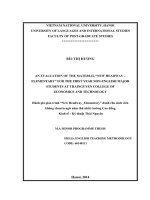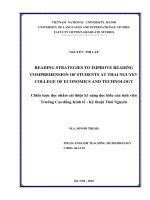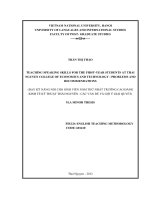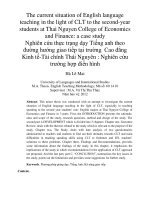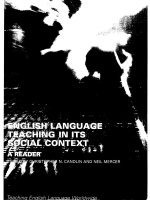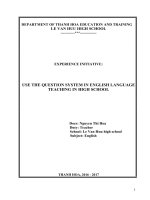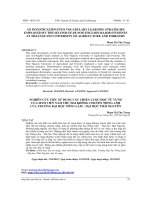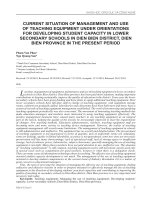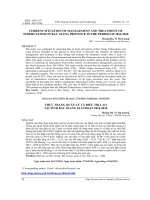The current situation of English language teaching in the light of CLT to the second-year students at Thai Nguyen College of Economics and Finance - a case study
Bạn đang xem bản rút gọn của tài liệu. Xem và tải ngay bản đầy đủ của tài liệu tại đây (222.06 KB, 7 trang )
The current situation of English language
teaching in the light of CLT to the second-year
students at Thai Nguyen College of Economics
and Finance: a case study
Nghiên cứu thực trạng dạy Tiếng anh theo
đường hướng giao tiếp tại trường Cao đă
̉
ng
Kinh tế-Tài chính Thái Nguyên : Nghiên cứu
trường hợp điển hình
Hà Lê Mai
University of Languages and International Studies
M.A. Thesis. English Teaching Methodology; Mã số: 60 14 10
Supervisor : M.A. Vũ Thị Thu Thủy
Năm bảo vệ: 2012
Abstract. This minor thesis was conducted with an attempt to investigate the current
situation of English language teaching in the light of CLT, especially in teaching
speaking to the second year students’ non- English majors at Thai Nguyen College of
Economics and Finance in 3 parts: First, the INTRODUCTION presents the rationale,
aims and scope of the study, research questions, method and design of the study. The
second part is DEVELOPMENT which is divided into 3 chapters: Chapter one, Literature
Review, deals with the theories related to the study which is relevant to the purpose of the
study. Chapter two, The Study, deals with date analysis of two questionnaires
administered to teachers and students to find out their attitudes towards CLT and main
difficulties in teaching speaking skills using CLT to freshmen and EFL teachers’
solutions to these problems. Chapter three, Findings and Recommendations, provides
some information about the findings of the study. In this chapter, it emphasizes the
implications of the study in which recommendations for the application of CLT approach
are proposed. And the last part, part C, “CONCLUSION”, summarizes the key issues in
the study, points out the limitations and provides some suggestions for further study.
Keywords. Phương pháp giảng dạy; Tiếng Anh; Kỹ năng giao tiếp
Content.
TABLE OF CONTENTS
PRELIMINARIES
Page
TITLE
i
APPROVAL SHEET
ii
DEDICATION
iii
ACKNOWLEDGMENTS
iv
ABSTRACT
v
TABLE OF CONTENTS
xi
PART A: INTRODUCTION
1
1
Rationale of the study
1
2.
Objectives of the study
3
3
Research questions
3
4
Scope of the study
3
5
Methodology
4
5.1
The objects
4
5.2
Instruments
4
5.3
The procedures
5
6
Significance of the Study
5
7
Organization of the study
6
PART B : DEVELOPMENT
7
CHAPTER 1 : LITERATURE REVIEW
7
1.1
Communicative Language Teaching (CLT)
7
1.1.1
Communicative Language Teaching Theories
7
1.1.2
Communicative Language Teaching Theories
7
1.1.3
Characteristics of CLT
8
1.1.4
Conclusion
8
1.2
Communicative language teaching and learning
9
1.2.1
Conditions related to CLT application
9
1.2.2
Roles of teachers and students in CLT Classroom
11
1.2.3
Issues in using CLT approach in the foreign language
classroom
12
1.2.3.1
Benefits of using CLT approach in the foreign
language classroom
12
1.2.3.2
Problems of applying CLT in the foreign language
classrooms and in second language classroom.
13
1.2.3.3
Previous studies related to CLT application in Viet
Nam
13
1.2.4
Previous studies related to CLT application in Viet Nam
13
CHAPTER 2 : THE STUDY
15
2.1
Background of the study
15
2.1.1
Description of the students at TCEF
15
2.1.2
Description of the teachers at TCEF
15
2.1.3
Settings of the study
15
2.2
Research methodology
16
2.2.1
Subjects
16
2.2.2
Survey instruments
17
2.2.2.1
Questionnaires for teachers
17
2.2.2.2
The classroom observation
17
2.2.2.3
The interview
17
2.3
Presentation of statistical results. 18
2.3.1
Questionnaire for teachers
18
2.3.1.1
Teachers’ teaching experience
18
2.3.1.2
Teachers’ CLT training background
18
2.3.1.3
Teachers’ opinions about the suitable method for
their teaching English at present
18
2.3.1.4
Teachers’ background on CLT
19
2.3.1.5
Teachers’ understanding of subjects about CLT
21
2.3.1.6
CLT ’s application in the actual classroom practice
24
2.3.1.7
Evaluation of English textbook regarding in CLT
application
27
2.3.1.8
Teachers’ opinions about the difficulties in the
implementation of CLT in their context of language
teaching
28
2.3.1.9
The degree of success in applying CLT at TCEF
29
2.3.2
Results of the class observation
30
2.3.3
Interview
34
CHAPTER 3: FINDINGS AND RECOMMENDATIONS
36
3.1
Findings
36
3.1.1
Difficulties from students
36
3.1.2
Difficulties from teachers
36
3.1.3
Difficulties arising from the testing system
38
3.1.4
Difficulties from the teaching and learning environment
38
3.2
Recommendations
38
3.2.1
For the students
38
3.2.2
For the teachers
40
3.2.3
Reform of the current English testing system
41
3.2.4
Improving the teaching / learning environment
41
PART C: CONCLUSION
42
1
Conclusions
43
2
Limitations
44
3
Suggestions for further study
REFERENCES
44
APPENDIXES
I
Appendix 1 Questionnaire for the teachers
I
Appendix 2 Lesson observation sheet
VII
Appendix 3 Interview questions
VIII
References.
Allwright, D. 1984. Why don’t learners learn what teachers teach?-The interaction
hypothesis. In Language learning in formal and informal contexts, ed. D. M. Singleton and
D. G. Little. Dublin: IRAAL.
Bock, G. (2000). Difficulties in Implementing Communicative Theory in Viet Nam.
Teacher;s Edition.VUN.
Canh, Le Van (2004) Understanding Foreign Language Teaching Methodology, VNU
Publishing House
David Grant and Robert McLarty, (1995) Business basics Oxford University Press
Dubin, Fraida, and Elite Olshtain, (1986). Course design: Developing programs and
materials for language learning. Cambridge: Cambridge University Press
Ellis, R. (1994). The Study of Second Language Acquisition. Oxford: Oxford University
Press
Gahin, G. & Myhill, D. (2001). The communicative approach in Egypt: Exploring the
secrets of the pyramids. TEFL Web Journal,
Freeman, D.L (1986) Techniques and Principles in Language Teaching. Oxford
University Press
Hao, Luan Thi Phuong, (2010) The current situation of English language teaching to the
grade 10 at Dong Hy Upper Secondary school, MA Thesis
Harmer, J (1991). The Practice of English Language Teaching. London: Longman.
Harmer, J (1998). How to Teach English. New York: Addison Wesley Longman Limited.
Hird, B. (1995). How communicative can English language teaching be in China?
Prospect 10/3. Australia.
Larsen-Freeman Techniques and Principles in Language Teaching Trade ,Oxford
University Press, 1986
Le Thi Hong Duyen, ( 2007) A Study on Teaching Techniques for Helping Students at
some High Schools in Hai Phong City to Overcome Difficulties in Learning Oral Skills in
The New Set of English Textbooks, M.A. Thesis, CFL-VUH
Li, D. (1998). “It is Always More Difficult Than You Plan and Imagine” Teachers’
Perceived Difficulties in Introducing the Communicative Approach in South Korea. TESOL
Quarterly.
Littlewood, W (1981). Communicative Language Teaching, Cambridge: Cambridge
University Press.
Littlewood, W (1990), Communicative Language Teaching. An Introduction. Cambridge:
Cambridge University Press
Littlewood, W (1992). Teaching Oral Communication. A Methodological Framework.
Cambridge: Cambridge University Press.
Littlewood, W (1998). Foreign and Second Language Teaching. Cambridge: Cambridge
University Press.
Lewis,M & Mc Cook, F.(2002) Cultures of teaching : Voices from Vietnam . ELT journal
Nunan, D.(1991) Language Teaching Methodology. UK: Prentice-Hall International.
Nunan, D.(1999) Second LanguageTteaching and Learning. Boston Mass
Pham Thi Thuan, ( 2005 ) An Investigation into the Reality of Teaching and Learning
English in an Upper-Secondary School in a Remote Mountainous Area of VietNam, M.A.
Thesis, CFL- VUH.
Richards, J.C. and Rodgers, T.S. (1986). Approaches and Methods in Language Teaching.
Cambridge University Press.
Sheils, J (1993) Communication in the Modern Language Classroom. London: Council of
Europe Press
To, T.H, Hoang, X.H, and Tran H.L. (2005). “Might CLT be successfully applicable
in Vietnam, especially in the English department”. ASIA TEFL. Conference, Beijing.
Tran Hien Lan, ( 2007) A Study on How to Teach Speaking Communicatively to Grade 10
Students at Tran Phu High School, M.A. Thesis, CFL- VUH.
Tran H.L. (2004). “Dạy bốn kỹ năng theo đường hướng giao tiếp” CFL- VNUH.
Van, Hoang Van (2006) Đổi mới phương pháp dạy học Tiếng Anh ở THPT Việt Nam
.Nha Xuat ban Giao duc
Websites:The advantages of communicative language teaching approach. Issuer: From
Asia.Tesol Views
Essential Principles of the Communicative Approach. Communicative Lesson are-http://
www. American.edu/tesol/CA%20Characteristics.pdf
